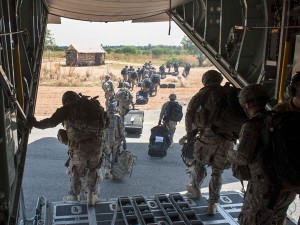Massacre, rapes, executions carried out in South Sudan – witnesses

In this photo taken Wednesday, Dec. 18, 2013 and released by the U.S. Air Force, soldiers of the East Africa Response Force (EARF), a Djibouti-based joint team assigned to Combined Joint Task Force-Horn of Africa, depart from a U.S. Air Force C-130 Hercules in Juba, South Sudan to support with an ordered departure of personnel from the city. AP
JUBA – South Sudanese soldiers have carried out a string of ethnic killings, including a massacre, house-to-house killings and rapes, following an outbreak of fighting more than a week ago, several eyewitnesses have told AFP.
Two witnesses alleged they were arrested by government soldiers along with an estimated 250 other men, herded into a police station in the capital Juba and then fired on.
The two witnesses, who were both wounded and managed to escape and take shelter at a UN base in Juba, said only 12 men survived the alleged massacre.
Testimonies from several other witnesses also paint a picture of a pattern of ethnically motivated violence, including killings and rape, since the fighting in the world’s youngest nation started on December 15.
The fighting is between troops loyal to President Salva Kiir and those loyal to his rival Riek Machar, a former vice president who was sacked in July.
Article continues after this advertisementKiir accused Machar of attempting a coup, while Machar says the president has exploited tensions within the army to carry out a purge. Rebels loyal to Machar have since seized control of several areas north of Juba, where ethnic killings are also reported to have taken place.
Article continues after this advertisementThe two victims of the alleged massacre said they were targeted as members of the Nuer tribe, to which Machar belongs, and that the soldiers who carried out the killings were ethnic Dinka, the majority tribe to which President Kiir belongs.
The testimonies cannot be independently verified because the few journalists and aid workers in the city have found their movements severely restricted.
AFP tried to visit the police station, situated in the Gudele neighbourhood, but was turned away by men in uniform and plainclothes forces. But the stench of death in the area was overpowering, with flies swarming around. The walls of the building were also riddled with holes.
Another ethnic Nuer man, who AFP will only name as Riek and who was also sheltering at a UN base in Juba, said he fled his job in South Sudan’s presidential guard on Sunday after witnessing a week of killings and rapes and fearing his comrades would eventually turn on him.
“There are soldiers doing this and militia of Dinka boys given guns,” he said, alleging that weapons were being distributed to Dinka youth from the president’s office.
Riek said that violent house-to-house checks were being carried out in Nuer neighbourhoods, and that anyone not answering the question “In choli” – meaning “What is your name?” in the Dinka language – would be dragged outside their home, tied up and shot.
The victims included women and children, he said.
South Sudan’s army denied its troops have been involved in any ethnic violence.
“This is not a tribal problem,” South Sudan’s army spokesman Phillip Aguer told AFP, denying any soldiers in uniform were committing atrocities.
“That is not true. There are criminals in Juba that have been killing people and they were there before,” he said.